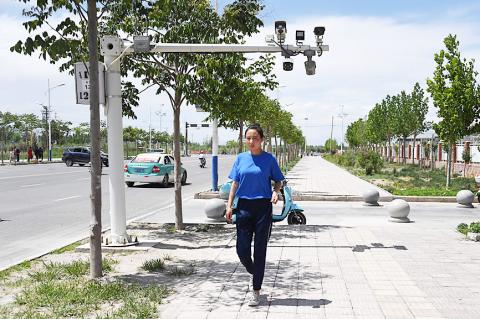Uighur activists on Tuesday said that they have documented nearly 500 camps and prisons run by China to detain members of the ethnic group, alleging that Beijing could be holding far more than the commonly cited figure of 1 million people.
The Washington-based East Turkistan National Awakening Movement, a group that seeks independence for the Xinjiang region, gave the geographic coordinates of 182 suspected “concentration camps” where Uighurs are allegedly pressured to renounce their culture.
Researching imagery from Google Earth, the group said it also spotted 209 suspected prisons and 74 suspected labor camps, for which it would share details later.

Photo: AFP
“In large part, these have not been previously identified, so we could be talking about far greater numbers” of people detained, movement director of operations Kyle Olbert said.
“If anything, we are concerned that there may be more facilities that we have not been able to identify,” he told a news conference in Washington.
Anders Corr, an analyst who formerly worked in US intelligence and who advised the group, said that about 40 percent of the sites had not been previously reported.
Rights advocates have generally estimated that China is detaining more than 1 million Uighurs and members of other predominantly Muslim ethnicities, but US Assistant Secretary of Defense for Asian and Pacific Security Affairs Randall Schriver in May said that the figure was “likely closer to 3 million citizens” — an extraordinary number in a region of about 20 million people.
Olbert said that archive imagery from alleged camp sites showed consistent patterns — steel and concrete construction over the past four years, along with security perimeters.
He said that the group tried to verify the nature of each site with on-the-ground accounts, but declined to give greater detail, citing the need to protect sources.
The Chinese Ministry of Foreign Affairs said that the allegations were “baseless.”
“East Turkestan organizations outside China have long conducted activities harming China’s national security,” ministry spokesman Geng Shuang (耿爽) said at a regular media briefing in Beijing yesterday.
He said it was “clear for all to see” that China’s policies in Xinjiang had promoted “ethnic unity and social harmony.”
Activists and witnesses say China is using torture to forcibly integrate Uighurs into the Han majority, including pressuring Muslims to give up tenets of their faith — such as praying, and abstaining from pork and alcohol.
Olbert described China’s policy as “genocide by incarceration,” fearing that Uighurs would be held indefinitely.
“It’s like boiling a frog. If they were to kill 10,000 people a day, the world might take notice, but if they were just to keep everyone imprisoned and let them die off naturally, perhaps the world might not notice. I think that’s what China is banking on,” Olbert said.
China has justified its policy after first denying the existence of the camps, saying it is providing vocational training and coaxing Muslims away from extremism.
The US has likened China’s treatment of Uighurs to Nazi Germany’s concentration camps, but Beijing has faced limited criticism outside the West.

MAKING WAVES: China’s maritime militia could become a nontraditional threat in war, clogging up shipping lanes to prevent US or Japanese intervention, a report said About 1,900 Chinese ships flying flags of convenience and fishing vessels that participated in China’s military exercises around Taiwan last month and in January last year have been listed for monitoring, Coast Guard Administration (CGA) Deputy Director-General Hsieh Ching-chin (謝慶欽) said yesterday. Following amendments to the Commercial Port Act (商港法) and the Law of Ships (船舶法) last month, the CGA can designate possible berthing areas or deny ports of call for vessels suspected of loitering around areas where undersea cables can be accessed, Oceans Affairs Council Minister Kuan Bi-ling (管碧玲) said. The list of suspected ships, originally 300, had risen to about

DAREDEVIL: Honnold said it had always been a dream of his to climb Taipei 101, while a Netflix producer said the skyscraper was ‘a real icon of this country’ US climber Alex Honnold yesterday took on Taiwan’s tallest building, becoming the first person to scale Taipei 101 without a rope, harness or safety net. Hundreds of spectators gathered at the base of the 101-story skyscraper to watch Honnold, 40, embark on his daredevil feat, which was also broadcast live on Netflix. Dressed in a red T-shirt and yellow custom-made climbing shoes, Honnold swiftly moved up the southeast face of the glass and steel building. At one point, he stepped onto a platform midway up to wave down at fans and onlookers who were taking photos. People watching from inside

Japan’s strategic alliance with the US would collapse if Tokyo were to turn away from a conflict in Taiwan, Japanese Prime Minister Sanae Takaichi said yesterday, but distanced herself from previous comments that suggested a possible military response in such an event. Takaichi expressed her latest views on a nationally broadcast TV program late on Monday, where an opposition party leader criticized her for igniting tensions with China with the earlier remarks. Ties between Japan and China have sunk to the worst level in years after Takaichi said in November that a hypothetical Chinese attack on Taiwan could bring about a Japanese

STREAMLINED: The dedicated funding would allow the US to transfer equipment to Taiwan when needed and order upgraded replacements for stockpiles, a source said The US House of Representatives on Thursday passed a defense appropriations bill totaling US$838.7 billion, of which US$1 billion is to be allocated to reinforcing security cooperation with Taiwan and US$150 million to replace defense articles provided to the nation. These are part of the Consolidated Appropriation Act, which the US House yesterday passed with 341 votes in favor and 88 against. The act must be passed by the US Senate before Friday next week to avoid another government shutdown. The US House Committee on Appropriations on Monday unveiled the act, saying that it allocates US$1 billion for the Taiwan Security Cooperation Initiative